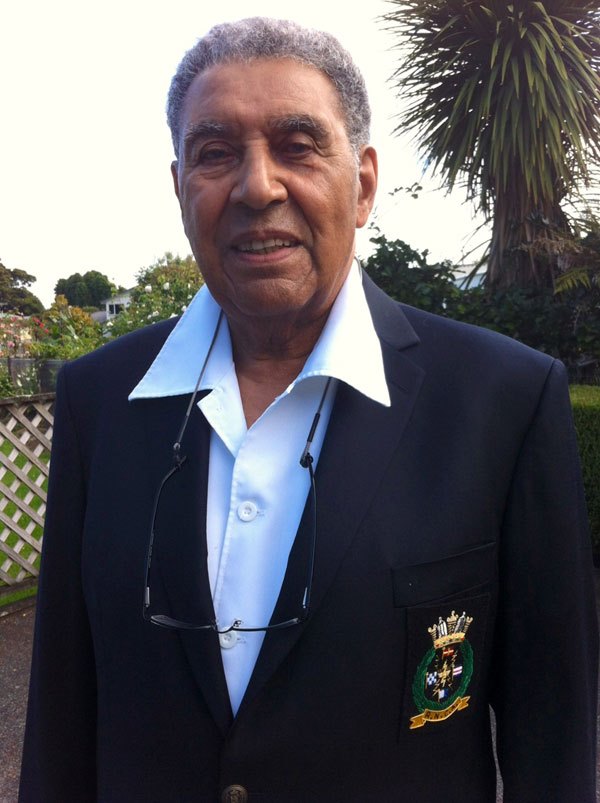Learning accompanied by fear: a memoir extract by Lewis Bobb

Lewis Bobb was born and educated in Amble. His family emigrated to New Zealand in 1948. Lewis and his wife came to live in Northumberland in 1998, returning to New Zealand 7 years later.
Lewis Bobb was born in Amble on 24 May 1926. He lived at 15 Northumbria Terrace, until he moved to New Zealand in 1948. During WW2, Lewis served in the Royal Navy, afterwards he gained his degree and went into teaching.
Lewis has compiled memoirs about his experiences growing up in Amble in the 1930s, including his experiences at the Amble Council School from 1931 – 1940. This extract is concerned predominantly with Mr Wilson, the Headmaster of Amble Council School.
I started school at Amble Council School at the age of five, and stayed at that establishment until I was fourteen years of age. It was one of three schools in the town the others being doctrinal and supported by Anglicans, and Roman Catholics.
In a way the sectarian Council School had a religious affiliation, since it embraced the ritual “the laying on of hands,” modified, appropriately, for secular use. Indeed, for some teachers at the school violence was an essential part of the curriculum.
I can still hear the admonitions of headmaster Mr. Wilson, to “take that silly smile off your face boy before I knock it off, ” said with relish, or the favourite of Mr. Atkinson, a very popular teacher who coached the football team, “get inside boy and I’ll warm your jacket for you.” How many jackets he had warmed gratuitously or otherwise during his time at the school I know not. These were men with whom one did not trifle; their words were not merely idle threats.
We usually played in the schoolyard until a handbell operated by another pupil was rung, then lined up according to class, and marched into the school to the accompaniment of music played by Betty Roland, a senior pupil. I still remember the very piece she usually played, a march containing dull repetitive lines played with vigour to encourage and enthuse our entry to class, but rarely did.
During periods of instruction we sat at attention in our desks, raising our hands in a quasi-fascist salute to indicate we knew the answer to a question, and occasionally standing to deliver a more formal answer. Each desk was provided with an ink well, which was filled and replenished from time to time with a concoction made by a designated ‘ink monitor.’
We used pens with metal nibs, and it was very difficult to prevent great blobs of ink from ‘molesting’ our written work. Neatness was another fetish of Mr. Wilson, and he was constantly urging us to “take pains with our work,” pointing to the lettering work of mediaeval monks as an example. I cannot recall anyone using his dictum to justify minimum amounts of work they had handed in.
Mr. Wilson, the headmaster, a Heinrich Himmler lookalike, was a formidable man who subscribed to the psychological premise that learning best takes place when accompanied by fear. This attitude had historic precedent, the great Samuel Johnson himself attributing his accurate knowledge of Latin to his mentor Mr. Hunter, who, he writes, “whipt me very well.”
Moving around the class checking work Mr. Wilson would suddenly exclaim “bless my soul alive boy, are you deaf, blind, dumb or what!” and follow this exquisite phrase with a blow to the back of the neck of the miscreant. He had fought during WWI but no one was quite sure on which side. We were often tempted to enquire, “Sir, after the war what did you do with your spiked helmet?” however, the thought was never articulated, and immediately dismissed from mind. Only pupils mentally deranged, or who had suicidal tendencies would have dared ask.
We were taught the decimalization of pounds, shillings and pence, how to compute compound interest, a completely meaningless pursuit given our personal circumstances, to identify parts of speech, and how to parse sentences.
Religious Instruction was included in the curriculum, but the only things I remember from these studies is that in the Holy Land, the washing of the feet with oil was a regular practice, and that the phrase “Mene Mene Tekel Upharsin” appeared on the walls of King Belshazzar’s palace. The way Mr. Wilson pronounced the phrase it sounded to our ears like “Meany, meany, tickle a Parson.” which amused everyone, and was repeated, always in private, to the accompaniment of gales of laughter.
He usually sat at his desk and pupils approached singly to have their work corrected or assessed. I remember his fingers emitted a perfume, a fragrance to which my nose was unaccustomed, and in retrospect, I can only assume he had used those very fingers to apply his after-shaving lotion. He was not in any way effeminate, and his use of fragrance was obviously a social thing, or a disguise intended to mislead since he was completely unconcerned about the olfactory sensibilities of his pupils.
On one memorable occasion while standing in front of Mr.Wilson’s desk while my work was being checked, Mary Basten, another pupil passed by, and obviously wanting me to commit suicide, tickled my bottom. Forty years later, I met Mary again in her home near the village of Shilbottle and reminded her of this occurrence. She smiled craftily.
Mr. Wilson had a particular aversion to the Northumbrian ‘Geordie’ dialect, regarding it as a foreign language, and constantly encouraged us to pronounce our ‘O’s’ and ‘A’s’ in a more cultured and refined manner. We never obliged, and when reading aloud, would deliberately sound vowels in the broadest Northumbrian dialect which would evoke a pained expression on his face. To those unfamiliar with the dialect, Geordie can be hard on the ears, for example, the song Who’s Taking you Home Tonight? would sound “Weeis tekin ee yem the neet?” and You’ll Never Know would be spoken as “eel niva na.”
Mr. Wilson’s true love was music, and we sang our way through the National Song Book in addition to other material. He was keen for us to have the facility to sing musical intervals such as fourths, sixths and major sevenths, intervals he would dictate using the Tonic Sol Fa system through the manipulation of his right hand, each hand signal signalling a scale note. From time to time he would say that he wanted us to develop “fruity voices,” though a demonstration of this vocal quality was never given.
We sang songs of great beauty, with Shakespearean lyrics projecting wonderful imagery, transporting one momentarily, in time and place, from the depressive monotony of our surroundings. “I know a bank whereon the wild thyme blows, where oxslips and the nodding violet grow, there sleeps the fairye queen.” The meaning of much of what we sang, especially Shakespearean lines, was never explained to us at that time, and though few understood or knew the import of what we sang, one did not dare not seek an explanation. I always enjoyed one particular song, Cherry Ripe, since it conjured a scene in another land “where the sunbeams sweetly smile,” far from the dull, grey Amble landscape of endless row housing. Had the opportunity occurred, I gladly would have immigrated to the land of Cherry Isle.
Eager to expand his musical base, Mr. Wilson devised a way to extend it through the establishment of clubs, which were to be held every Friday afternoon. We were given a choice of activities: Music, Art, Drama, and Physical Education, and though I listed music as my last choice, found myself allocated to his Music Club. Democractic principles were seldom practiced at Amble Council School.
As mentioned previously, in those days one could never question authority, ask why such and such a statement was right, nor complain about mistreatment. Smiles and/or laughter in class were forbidden, and should these expressions of contentment and pleasure occur during the course of a lesson, they were summarily dealt with. Wilson’s pet phrase, “Take that silly smile off your face, boy,” demanded instant obedience, and if satisfaction was denied, the offender was ordered into his “private room” and caned.
As one might imagine, there were absolutely no disciplinary problems in the class, and the atmosphere at times was so tense that one might easily smile and then burst into uncontrolled laughter. That pupil would be immediately ordered into his private room. When this occurred, the victim’s face underwent an instant transition from laughter into tears, remarkable and marvelous to behold. The unfortunate would leave the class, his face wreathed in smiles, returning in a state of utter dejection. Girls were never subject to this violence, however, and were merely witnesses. I never ventured to enquire what they thought about it all.
Caning in Wilson’s private room did not preclude him giving public performances, and he often administered six of the best with his strap without having to leave the classroom. And it must be said he was completely free from any form of social discrimination, strapping his youngest son Gilbert with the same enthusiasm and zest he applied to others.
Elevating on his toes to achieve maximum effect, he swung his strap with rhythmic, precision and symmetry, as if he were hurling grenades; indeed, we often thought he suffered lapses of memory and saw our desks as enemy positions and the pupils as enemy insurgents. On rare occasions some recipient of the strap would withdraw his hand just before the moment of contact, so the strap would simply cleave the air. When this happened, the offender’s wrist would be firmly held by Mr. Wilson and the punishment repeated plus a few extras.
One of our school companions, an excellent football player, for reasons incomprehensible but possibly associated with sheer terror, had difficulty telling the time, and Wilson would have him standing out in the hall staring at the large school clock, trying to decipher its message. “The big hand is on five, and the little one between nine and ten,” the terrified pupil would say. And yet, it was amazing that a person who could administer corporal punishment with such vigour, and engender fear to such great effect should be influenced, entranced even ‘enthused’ by the beauty of music.
Such, however, was the case. We did hear that during WWI at Christmas, soldiers of opposing sides would sing carols, indeed, even fraternize, and then at the sound of a whistle, continue the carnage with unabated fury. It was like that in our class; having conducted us through a number of exquisite songs, the music lesson would end, the ceasefire terminate, and Wilson’s pedagogical war would continue.
One day before the music lesson began, the school piano was wheeled in followed by an attractive young teacher, Miss Tait, who, we discovered, was to be our regular accompanist. Most of the lads in the class were immediately smitten and subsequently concocted meaningless sounds to convey their sentiments. “Miss Tait …whey,” Geordie Handyside would say, being the extent of his vocabulary to convey words of affection and admiration. Others, I’m sure, wanted to propose, but probably felt that at the age of ten, the possibility of marriage to an adult while receiving pocket money of a penny or so a week was impracticable and out of the question.
I cannot recall being enamoured of Miss Tait’s piano playing, but I do vividly remember her part in one of Wilson’s favourites, The Song of the Jolly Roger, written for an adult male choir. The last bars of the song required the chorus to sing a descending bass line using sounds of laughter, “Ha Ha Ha Ha Ha,” which required voices capable of operating in this register. Our squeeky castrati-like voices must and did sound ridiculous trying to reproduce this effect, but Mr. Wilson liked the song, and so it was sung with frequency.
During the song there was a pause which provided space for a two bar piano solo which preceded the final verses, and it was here that Miss Tait plunked away with gusto a “dah dit dit dah, dah dit dit dah, dah dit dit dit, dah” piano interlude followed by the final lines of the song, “Here’s to each man, each man of that jolly jolly crew, who sailed the deep blue sea, who sailed the deep blue sea, who sailed the deep blue sea,” words which continued until the song concluded with a descending sequence of laughs in the bass register. After some considerable search I was able to locate a sheet copy of this song, and now play Miss Tait’s interlude, which brings back memories of yesteryear. Having acquired an accompanist Wilson was able to conduct which he did in unusual fashion, grasping his cane at each end and pumping it up and down as if he were in the process of inflating a tyre. No one dared to laugh.
Often, while in full voice, Mr. Wilson would suddenly interrupt a song, his face giving the impression he was experiencing an apparent apoplectic fit, “we have a groaner in the room” he would exclaim, “we have a groaner,” and then he would move from pupil to pupil attempting to discern the source, listening to each individual voice in turn. Usually, it was poor ‘Bunt’ Jackson, whose singing voice seemed to convey an outer expression of inner problems related to his dysfunctional home life. In addition to dispensing his own disciplinary requirements, Mr.Wilson would assist women teachers who had problems, and children sent out of the classroom by these ladies would be taken care of. Like a cat, he was always on the prowl, and a pupil found standing outside the door of any room signaled the need for immediate intervention.
Years and years later, while out jogging at Warkworth early in the morning, I suddenly came across the magnificence of the castle bathed in early sunlight. Such was my indoctrination that spontaneously, the words of a favourite in Wilson’s repetoire sprang to mind; “when morning fills the skies, my heart awakening cries, let Jesus Christ be praised. ” There is no question that of all teachers I experienced, due to his strong interest and devotion to music Mr. Wilson has had the greatest influence. After seventy-five years, yea more, I still recall, with the greatest of pleasure and considerable gratitude, most of the songs and rounds we sang. I have a picture of Mr. Wilson with his entire family, sent to me by Genevievre, the wife of his youngest son Gilbert, who sent me a pictorial memorial following Gilbert’s passing. And yes, upon inspection of the family portrait, Mr Wilson could pass as a twin brother of Heinrich”













Would this Lewis Bobb have taught in Canada, in Don Mills, in the 1970s? If so, I was his student, and would be interested in learning more about the rest of his biography. Thank you.
He is my uncle and he used to live in Toronto and taught at the University I believe.
looks like the teacher we had in medicine hat, alberta in the 1960s. unconventional. interesting. funny. he was one of my favorite teachers.
Lew Bobb was my history teacher at George s Henry in Toronto in the late 1960s
I have always said he was my best teacher
Today on international teacher day I remember his impact on my career again
Hi Susan,
I’m so pleased you have pleasant memories of Henry circa 1968.
Memories, especially those of the pleasant variety become increasingly important as one advances in years.
You are well remembered, and I still have a book “The Last Laird of MacNab” given to me by your
parents.
Mr Bobb taught me history in grade 7 and again in high school. I love history and I credit Mr Bobb with teaching excellent writing skills which I still remember and use. In particular ask yourself after each sentence : is that true? Is that what I want to say? Can it be said in fewer or more interesting words? And I also remember many entertaining stories of avoiding piano lessons and the perils of studying in the bath. Very nice to hear about a favourite teacher after so many decades.
Mr Bobb was my Man In Society teacher at George S Henry in Toronto. He brought a piano in one day and played honky tonk like i had never heard before. He instilled a love of history and a lifelong love of honky tonk!! Thank you for always being my favourite memory of high school
Mr. Bobb was my favourite teacher at George S. Henry. I had him for only one year, teaching history. He expected a lot and challenged us to use our minds. He’s one of those teachers who, when asked what teacher made a significant impact on you, it is Mr. Bobb who jumps to the forefront of your mind.
Mr. Bobb, Are you memoirs published? I’m sure there are many of us who would really enjoy reading them.
Mr. Bobb had a profound impact on my education and the direction I took. He believed in me and encouraged me to continue with my education. As a result I became a teacher, always remembering how he inspired and accepted only the best from each of us. I have often shared memories with fellow students. We all agree that his style and directness had an impact on our lives….Not to be forgotten was his great sense of humour and fabulous piano playing!
Hi
I taught with Lew at Henry until he retired and
returned to NZ. I’m currently passing through Wellington
and decided to Google him.
Glad to hear he’s still active. (BEST history
teacher GSH ever had)
His teaching style would not be allowed today but it was so effective. I remember him saying I do not want your opinion unless you can back it up with others who have done the research. When I see a news article I still think of that logic.
Hi I came across by chance ( I was researching the painter Arthur Young) about Lew Bobb. I lived next door to lew in Christon Bank before he eventually went back to New Zealand with his wife Carol. He was a wonderful character, and a fantastic jazz pianist,styled on Errol Garner.He invited my husband and I to a music night at his home .a drummer,double bass and of course lew on the piano,my husband Gordon also a guitarist in his younger days so enjoyed it a night to remember happy days kind regards Anne.
Mr. Bobb has always been one of the most memorable people in my life. He taught us Social Studies in Medicine Hat when I was in grades 8 and 9. My maiden name was Linda Enns, and I remember him sitting on a desk at the front of the class and, grinning wolfishly, saying “I tried and I tried but I couldn’t make Enns meet”. He came to our house one night and showed my parents his glorious slides of New Zealand. But what interested me the most about him was his piano playing, and I was completely enthralled by his jazz renditions. I think he performed in the Hat with a jazz trio. I had a big crush on the exotic Mr. Bobb…
Linda — I am Lew’s wife, and I am sorry to tell you that Lew died in February 2021. Since then, his memoirs were republished by ex-students in Toronto, and the Esplanade Arts and Heritage Centre in Medicine Hat has a copy. If you contact Jenni Barrientos, I think she could assist.
Thank you for sharing your kind thoughts and memories.
Carol Bobb
Carol, your loss must be so great. Yet perhaps the memories of your life together are even greater. I’m sorry he’s gone, as we all must go.
Thank you for the suggestion.
I send you my blessings and all good wishes.
Linda.
My condolences. So sorry to learn of Lew’s passing. He lived a long and very full life and I hope you can take consolation in that.
He taught me history in 1964 at Milneford Junior High School in Toronto, and he was one of the most memorable characters I ever met — larger than life. I lost track of him after junior high school, although I heard tell that he taught at George Henry. Ever the free spirit, he obviously continued to be well-traveled. Evidently, he was better traveled than I realized. I knew he came to us from New Zealand, but I thought he was born there. Northumberland!
Thanks for the memories, Lew!
Kim